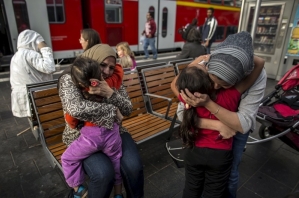LUEBECK, Germany, Sept 21 (Reuters) - Her epic journey across a continent was coming to an end in northern Germany, thousands of miles from the war which has bled her country for longer than the young girl can remember.
But six-year-old Yasmine was still thinking of home in Deir al-Zor, the old city on the Euphrates river which winds through the deserts of eastern Syria.
"My country is the best in the world. I will return when the war is over," Yasmine told me on the train to Luebeck, where she, her parents and younger sister were reunited with their extended family who all fled Syria's brutal conflict.
When they first escaped Syria they had no plans to come to Europe - hoping to stay in Muslim countries closer to home.
But life in Lebanon and Turkey, already hosting millions of Syrians, was tougher than expected, and they joined the hundreds of thousands of people pouring into southern Europe this summer.
Their experiences on the week-long journey, from the warm-hearted welcome of a Viennese mother to the rapid shuttering of national borders, reflected the muddled European Union response to the wave of humanity trekking north.

MEMORIES OVERBOARD
When I met them on Sept. 11 on the Greek island of Lesbos, Yasmine's family had already criss-crossed their own country in search of safety, before spending months in Lebanon. In late August to they took a ferry to Turkey, where they paid human traffickers for the short but dangerous boat trip to Lesbos.
The traffickers charged exorbitantly - one family making the same journey paid 2,250 euros ($2,500) for each person squeezed in a small inflatable boat, forcing them to sell a pair of earrings to help them meet the cost.
Yasmine's family paid an additional price when the men in charge of the boat threw their bag overboard. Inside it were wedding pictures of her parents Ihab and Abeer and a dress given to Yasmine by her grandmother Houda.
Ihab said it felt like all his happy memories had been lost.
Arriving on the Greek mainland before dawn with their funds exhausted, Ihab left his family outside a travel agency while he arranged for his relatives in Luebeck to send more money.
Abeer, who before the war enjoyed the comfort of a large family house and her husband's regular state salary, found herself sat on the pavement in a foreign country, helpless and hungry. None of the family speak anything but Arabic.
"I am ashamed to expose myself in such a way," Abeer told me. "Everyone is watching. I feel like a beggar."
Five hours later, Ihab returned with money, and the family set off on the next leg of their journey by bus and train through Macedonia and Serbia and into Hungary - a key crossing into the European Union's Schengen zone of border-free travel.
News that Hungary was closing its border with Serbia on Sept. 15 brought fresh urgency to their planning.
In Macedonia, after stepping off a packed and stinking train onto a cold stone platform at 6 am, I was separated from Ihab's family, unable to cross the next frontier with them.
They reached Hungary before the route north was closed by razor wire and troops, and got to Austria, by which time the journey had taken its toll on the 30-year-old Syrian father.
"I arrived very sick at the Austrian border, and I collapsed while queuing to get into a bus taking us somewhere - I can't remember where," Ihab said.
A WARM WELCOME
Vienna brought an unexpected change in fortune. An Austrian woman opened up her home and treated them like her own family. "I had a hot bath. We slept in clean sheets. What happiness!" Abeer said.
That individual act of generosity contrasted with the rapaciousness of others - Ihab said he spent many thousands of euros on the journey, and felt he was often charged 10 times the fair rate for food, taxis and bus fares. In the space of five days, the family could afford only three meals, he said.
Their arrival in Germany, where they were taken off a train and spent 24 hours in a police station, was also uncomfortable.
Ihab couldn't smoke, and became stressed. Abeer was not allowed to retrieve medicine to calm their younger daughter, and no one could go to the toilet unaccompanied.
They were subjected to detailed questioning and medical inspection - which reminded Ihab of growing up in President Bashar al-Assad's authoritarian Syria.
"I was completely naked ... I felt like I was imprisoned by Bashar's forces. There was no difference," he said. Abeer, who dresses modestly and wears an Islamic headscarf, was also troubled. "For the first time in my life I had to take off my clothes in front of strangers," she said.
Finally they were on their way again, to Luebeck and a family reunion.
"Umi! Umi!" Ihab cried - Mum! - as he broke into a run on the platform, where his mother Houda and three siblings welcome him with tears of joy.
They had fled Deir al-Zor shortly after Ihab and Abeer, but headed for Turkey after Islamic State militants blocked their route to Lebanon. Feeling unwelcome in Turkey, they traveled onward to Europe.
While the move to Europe's biggest economy offers prosperity as well as safety, Ihab said it wasn't that which brought him to Luebeck. "I can't live without my parents and brother and sisters," he said. "Family is precious."
($1 = 0.8866 euros)
(Writing by Dominic Evans)







